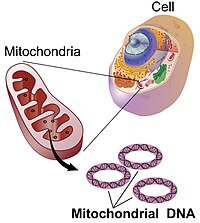
Photo from wikipedia
Mitochondrial DNA (mtDNA) is an effective genetic marker in forensic practice, especially for aged bones and hair shafts. Detection of the whole mitochondrial genome (mtGenome) using traditional Sanger-type sequencing is… Click to show full abstract
Mitochondrial DNA (mtDNA) is an effective genetic marker in forensic practice, especially for aged bones and hair shafts. Detection of the whole mitochondrial genome (mtGenome) using traditional Sanger-type sequencing is laborious and time-consuming. Additionally, its ability to distinguish point heteroplasmy (PHP) and length heteroplasmy (LHP) is limited. The application of massively parallel sequencing in mtDNA detection helps researchers to study the mtGenome in-depth. The ForenSeq mtDNA Whole Genome Kit, which contains a total of 245 short amplicons, is one of the multiplex library preparation kits for the mtGenome. We used this system to detect the mtGenome in the blood samples and hair shafts of thirty-three individuals from eight two-generation pedigrees, one three-generation pedigree, and one four-generation pedigree. High-quality sequencing results were obtained. Ten unique mtGenome haplotypes were observed in the mothers from the ten pedigrees. A total of 26 PHPs were observed using the interpretation threshold of 6%. Eleven types of LHPs in six regions were evaluated in detail. When considering homoplasmic variants only, consistent mtGenome haplotypes were observed between the twice-sequenced libraries and between the blood and hair shafts from the same individual and among maternal relatives in the pedigrees. Four inherited PHPs were observed, and the remainder were de novo/disappearing PHPs in the pedigrees. Our results demonstrate the effective capability of the ForenSeq mtDNA Whole Genome Kit to generate the complete mtGenome in blood and hair shafts, as well as the complexity of mtDNA haplotype comparisons between different types of maternal relatives when heteroplasmy is considered.
Journal Title: Genes
Year Published: 2023
Link to full text (if available)
Share on Social Media: Sign Up to like & get
recommendations!